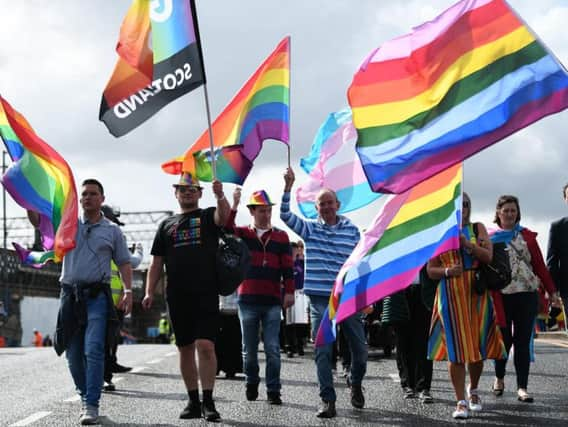Controversial list of sexualities could be dropped from Scottish Census


Cabinet Secretary Fiona Hyslop told a Holyrood committee that she had "sympathy" with concerns about the list and was not "convinced" it was "something we want to pursue."
However, the committee was also told that the 2021 Census will continue to have guidance on how to answer the sex question, which will allow transgender people to self-identify their sex, despite 80 academics and data experts raising concerns about the potential impact on the robustness of the information.
Advertisement
Hide AdAdvertisement
Hide AdThe Census has been the centre of heated debate about sex and sexual orientation since the legislation for the new Census Bill was first laid before Parliament.
The National Records of Scotland, which produces the Census question, proposed that if someone clicked on the "other sexual orientation" box, they could choose from options such as "skoliosexual", "gynephilic", "demiromantic" and "unsure". The NRS said the list had been designed in conjunction with stakeholder groups.
The introduction of the list has been backed by 72 LGBT+ organisations who have written to MSPs saying: "We stand for full inclusion in the census. People must be allowed to record their own sexual orientation, even if they use less common terms."
However, SNP MSP Joan McAlpine, convener of Holyrood's culture committee which is scrutinising the draft Census Order, said that the catalogue of sexualities had left the NRS open to "ridicule".
She raised the issue again last week with Ms Hyslop and NRS representatives, when they appeared before committee, and said the predictive responses were not being used by the Office for National Statistics - which produces the Census in England and Wales.
Quoting Dr Kath Murray of Edinburgh University, Ms McAlpine, said: "A sexual orientation question with overly complex predictive response options, not all of which describe the sex that a person is attracted to, means that less information may be collected on the protected characteristic of sexual orientation. Demi-romantic, for instance, does not tell us if a person is gay, lesbian, bisexual or heterosexual so doesn't give us the information we need to be collected."
Ms Hyslop responded: "I've got some sympathy with that point. I do think there should be a question that is "other" and people can fill that in, as there is with lots of other questions across the Census, but I'm less convinced the predictive text is something we want to pursue."
On the sex question, MSPs raised concerns about the guidance which is printed with the Census, which will allow people who are transgender to answer it in their "lived sex" rather than their biological sex. The guidance was introduced for the first time at the last Census in 2011, but the committee has said that it was done with no consultation.
Advertisement
Hide AdAdvertisement
Hide AdREAD MORE: Sex orientation and transgender status to be asked in Scots censusAddressing Ms Hyslop, SNP MSP Kenny Gibson said: "The proposed guidance says "if you're transgender the answer you give can be different to what's on your birth certificate and you don't need a Gender Recognition Certificate". How does that help capture accurate data if folk are effectively encouraged to put on whatever they wish?
"There's a conflation between sex and gender there and the view of the committee is sex and gender are not the same, but in the question being proposed it's as if they are the same. Surely the alternative proposed guidance being tested is much clearer, which says the answer you provide should be the same as your birth certificate if you have a GRC you may record your recognised legal sex as the Census goes on, in following question, to allow people to answer on their trans status.
"So I don't understand what the purpose would be in having guidance which effectively says it really doesn't matter what's on your birth certificate you can answer any way you like. How is that going to provide accurate date that academics say is essential. I know you mention it affects 0.5 per cent as if its insignificant but it's still 27,000 people of the Scottish population, a significant number of people."
Ms Hyslop said: "And that's why we want to capture them. That's the issue. Certainly the discussions before 2011 was people didn't want to fill in the questionnaire because there wasn't somewhere for them to answer and the guidance introduced then was there to help them.
"If we want to improve the quantity of those completing [the Census] and if people get to the sex questions and say I can't answer this, then they'll stop completing the rest, and of course its mandatory, so should we try and include them or say we're not giving you a way to answer? Do we want to include those 27,000 or not? Will having self identification guidance help them complete that? I think we know the answer is yes. And given most people will complete online we have to remember the transgender question can only be got to if you answer the sex question."
She added: "For the vast majority of the population they will complete the sex question without the guidance. The Census has always been on a self-completion basis - you can't go round to everyone's house and say have you filled this in accurately. We have to take it on trust and expect people to be honest. What we know from testing that we've done is the vast majority of people don't look at guidance."
The Census is due to be answered on Sunday March 21, 2021.